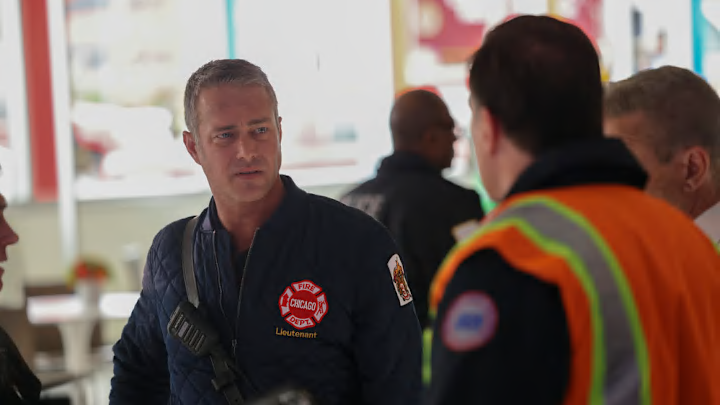For over a decade, Chicago Fire has been a cornerstone of NBC’s One Chicago franchise, captivating viewers with high-stakes rescues and the unwavering camaraderie of Firehouse 51. At the heart of that team stands Lieutenant Kelly Severide, portrayed with intensity and depth by Taylor Kinney. Severide has become a fan favorite, defined by his skill, loyalty, and personal struggles—but a detail from the show’s pilot adds an unexpected layer of poignancy to his journey.
A Haunting Introduction
In the pilot episode, aptly titled “Pilot,” the show opens with a massive warehouse fire. The team is immediately thrown into chaos, forced to make life-or-death decisions. Amid the tension, Severide speaks for the first time. His line is simple but telling:
“You see that?”
Directed at his best friend and rival, Matthew Casey (Jesse Spencer), the question points out a structural weakness in the building. On the surface, it’s a pragmatic, professional remark—but the timing is chilling. Seconds later, the building explodes, trapping the team and claiming the life of Andy Darden. This tragedy becomes the central conflict of Season 1, creating guilt and tension between Severide and Casey and establishing the emotional stakes that would define the series.

Foreshadowing and Emotional Weight
Kinney’s very first line is more than a practical observation—it’s a foreshadowing device. It signals the show’s commitment to exploring not only the physical dangers of firefighting but also the emotional and psychological toll. Severide’s question resonates on multiple levels: it highlights unseen dangers, both structural and emotional, and foreshadows the internal conflicts that will haunt him and Casey throughout the series.
The brilliance lies in how this line encapsulates the series’ themes. It’s a quiet moment that hints at the fragility of life, the unpredictability of tragedy, and the weight of loss. Severide’s instincts, skills, and awareness are on full display, but so too is the harsh reality that even the most prepared firefighter cannot prevent every disaster.
Setting the Tone for the Series
The pilot sets a bold precedent. Killing off Darden immediately establishes the stakes: no character is safe, and every decision carries emotional weight. The subsequent feud between Severide and Casey isn’t a simple rivalry—it’s fueled by grief, guilt, and the desperate search for someone to blame. Kinney’s line becomes emblematic of this narrative: a seemingly small question loaded with tension and foreboding.
It also underscores the show’s focus on character-driven storytelling. Chicago Fire isn’t just about firefighting; it’s about the relationships forged under extreme pressure. The bonds, conflicts, and shared trauma among the team are what make the series resonate. Severide’s first line reminds viewers that the series’ heart lies in these quiet, human moments as much as in the explosive action sequences.
A Legacy in a Single Line
For fans revisiting the pilot, Kinney’s first words carry new meaning. They mark the introduction of a character who would grow, struggle, and endure, shaped by the tragedies that surround him. That single line—uttered just before a defining disaster—encapsulates the essence of Severide and Chicago Fire: vigilance, loyalty, courage, and the awareness that danger can strike at any moment.
Ultimately, Taylor Kinney’s first-ever line on Chicago Fire is a masterstroke of storytelling. It’s a statement of purpose, a foreshadowing of tragedy, and a powerful introduction to a character whose journey is both heroic and deeply human. For viewers, it’s a moment that defines not just Severide but the emotional legacy of the entire series.